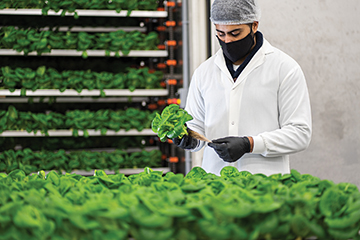ABBOTSFORD – Vertical farms will no longer have to seek permission from the Agricultural Land Commission to set up on protected farmland under a host of changes announced
February 20.
“We are making changes to support agritech and intensive crop production, like vertical farming, on the Agricultural Land Reserve,” BC agriculture minister Lana Popham said in a sparsely attended Saturday morning news conference on the Family Day long weekend. “Regulatory updates are needed to ensure there is clarity about which new innovative systems are allowed on the ALR.”
Popham said the move addresses a host of pressing issues, including food security, economic assistance to Abbotsford following the devastating November floods, and climate change.
“The future of farming and food production here in BC is one where we must consider all options,” says Popham, who considers vertical farms a natural extension of greenhouse systems. “Vertical farming will create even more opportunities to increase the food supply in the province, allowing farmers new options to produce more food year-round in more challenging climates.”
In addition to the rule change, the province is also pressing ahead with its Regenerative Agriculture and Agritech Network, an agritech concierge overseen by the BC Ministry of Jobs, Economic Recovery and Innovation and an agritech centre of excellence.
The announcement makes good on a recommendation the BC Food Security Task Force made in January 2020 to open the ALR for agritech development. It proposed setting aside more than 28,400 acres of protected farmland for agritech and agri-industrial uses. Popham downplayed criticism at the time, but the new proposal goes a step further by greenlighting agritech ventures across the ALR.
The exact wording of the new regulation has not been released.
Richmond’s Harold Steves, who was instrumental in establishing the ALR in 1973, called out the province on Twitter.
“This #BCNDP Government has destroyed more farmland than all other governments combined since the #ALR saved farmland in 1973,” he says. “Just as we were getting resigned to the loss of 10,000 acres at #SiteC we are faced with the loss of more farmland to industry.”
Shaundehl Runka, a former land commissioner who served on the task force Popham set up in 2018 to recommend ways to revitalize the ALR, expressed frustration. She called out the original proposal to create an agri-industrial zone within the ALR, and the current proposal is no better.
“This is another thinly veiled excuse to use less expensive ALR land for a use that could be located elsewhere. It is no different than monster homes or other types of industrial activity locating on ALR land,” she says. “This is exactly the kind of land use pressure that led to the creation of the ALR.”
She wonders why the province isn’t creating opportunities for new farmers to secure land within the ALR.
“It is shocking to hear that government will be helping agri-tech industry to secure land in the ALR,” she says. “They could instead be helping young farmers enter the land market for agriculture or existing farmers to expand.”
Opposition agriculture critic and Delta South MLA Ian Paton echoed the concerns.
“God knows they’ve covered up enough prime farmland in Delta with greenhouses, which is almost the same as vertical farming. Instead of growing lettuce, they’re growing cucumbers, tomatoes and peppers. But it’s all, basically, on a concrete floor,” he says.
Moreover, controlled-environment systems like greenhouses and vertical farms are typically beyond the means of new entrants, unless they’re extremely well capitalized.
“It’s cost-prohibitive,” he says. “There’s only 12 vertical farms in all of Canada. And why is that? This is something that people with suits and ties get into from downtown Vancouver, not conventional farmers.”
Changes to provincial regulations typically require a period of public feedback. However, Popham did not indicate any chance for public input. Instead, she said the change will take effect in August through an order-in-council.
Paton plans to challenge the rule change in the legislature.


 Building back better means avoiding past mistakes
Building back better means avoiding past mistakes